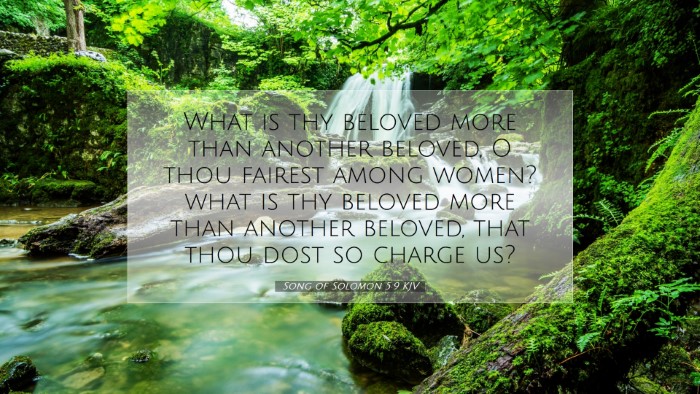Commentary on Song of Solomon 5:9
The verse Song of Solomon 5:9 presents a profound inquiry about the nature of love and beauty. The verse reads:
"What is thy beloved more than another beloved, O thou fairest among women? what is thy beloved more than another beloved, that thou dost so charge us?"
Analysis and Insights
This verse raises crucial questions about the attributes and significance of the beloved, emphasizing the distinctive qualities that define genuine love.
Contextual Background
The Song of Solomon, traditionally attributed to Solomon, is poetic in nature, rich with metaphor and imagery. The dialogue between the lover and the beloved signifies the deep emotional and spiritual connections that govern romantic relationships. The verse in question falls within a reflective context, where the beloved is asked to justify the exceptional nature of her love.
Commentary Insights
Matthew Henry
Henry explains that the question posed serves as a catalyst for exploring deeper relational dynamics. It queries the essence of the beloved's worth. In this view, the dialogue prompts readers to reflect on their own comprehension of love and idolization.
Henry suggests that the inquiry highlights the beloved's uniqueness and the distinctiveness of true love in the context of personal and communal relationships. It encourages believers to pursue a greater understanding of God's love, as paralleled by the affection shared between lovers.
Albert Barnes
Barnes observes that the repetition of "What is thy beloved more than another beloved?" signals a longing for clarity on how this love differentiates itself from mundane affection. He notes that the speaker seeks to highlight the unparalleled aspects that demand attention and admiration.
Barnes elaborates that such a question can lead to an exploration of the beloved’s attributes, classified as beauty, grace, and virtue. This serves to strengthen the union between the couple and evokes a desire for deeper intimacy and understanding, serving a dual purpose of establishing value and stimulating emotional engagement.
Adam Clarke
Clarke posits that this inquiry also touches on themes of jealousy and rivalry. By questioning the beloved's unique qualities, it reveals an inherent desire to possess and understand love more fully.
Clarke suggests that the verse invites reflection on spiritual matters, as it symbolizes the Church seeking to understand the nature of Christ. The beloved’s attributes could be interpreted as analogous to Christ's love for His Church, calling for deeper examination and admiration of divine qualities.
Theological Implications
This verse not only invites personal introspection but also extends into theological realms. The inquiry about the beloved’s qualities serves as a metaphor for an individual's relationship with the Divine.
Attributes of the Beloved
Key attributes that could be drawn from the commentary composers include:
- Beauty: Reflecting divine aesthetics and the pursuit of moral and spiritual beauty.
- Excellence: A call to consider intrinsic virtues, surpassing ordinary understanding.
- Uniqueness: Emphasizing the distinction of the beloved calls for realization of one’s spiritual identity in Christ.
Pastoral Applications
For pastors and leaders, this verse serves as a reminder to cultivate relationships that reflect the nature of Christ's love, encouraging congregations to deliberate on these qualities within their lives.
It challenges believers to reflect on what makes their love distinctively Christian, urging them to seek out and emulate the beauty and virtues of Christ in their interactions with others.
Conclusion
Song of Solomon 5:9 serves as a rich theological discourse on the nature of love, calling for careful reflection on what constitutes true affection. Pastors, scholars, and students alike can draw significant insights from the examination of this verse, prompting them to seek deeper awareness of the attributes of their beloved — both divine and human.


